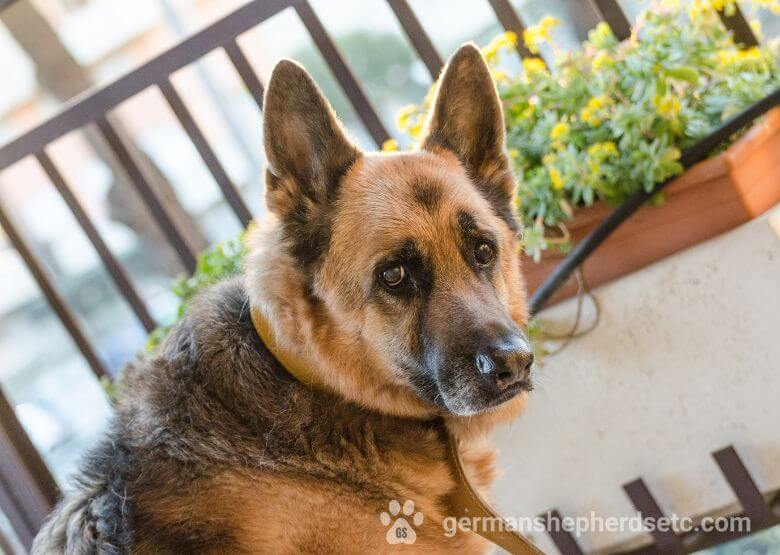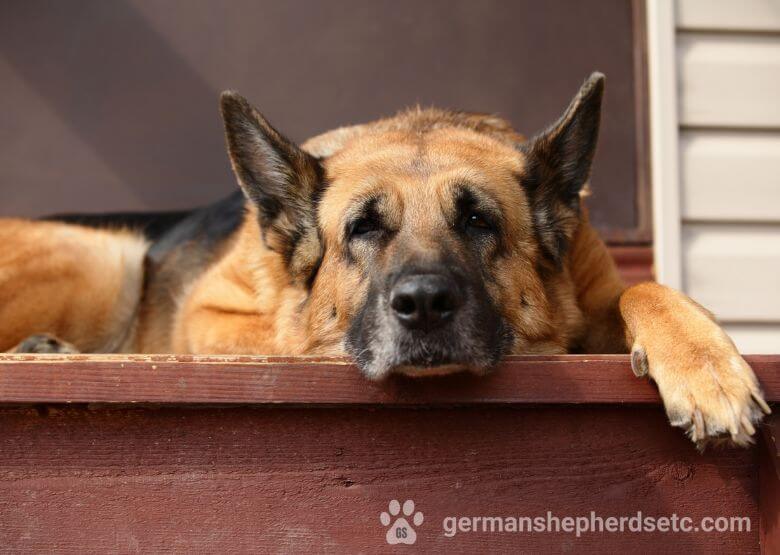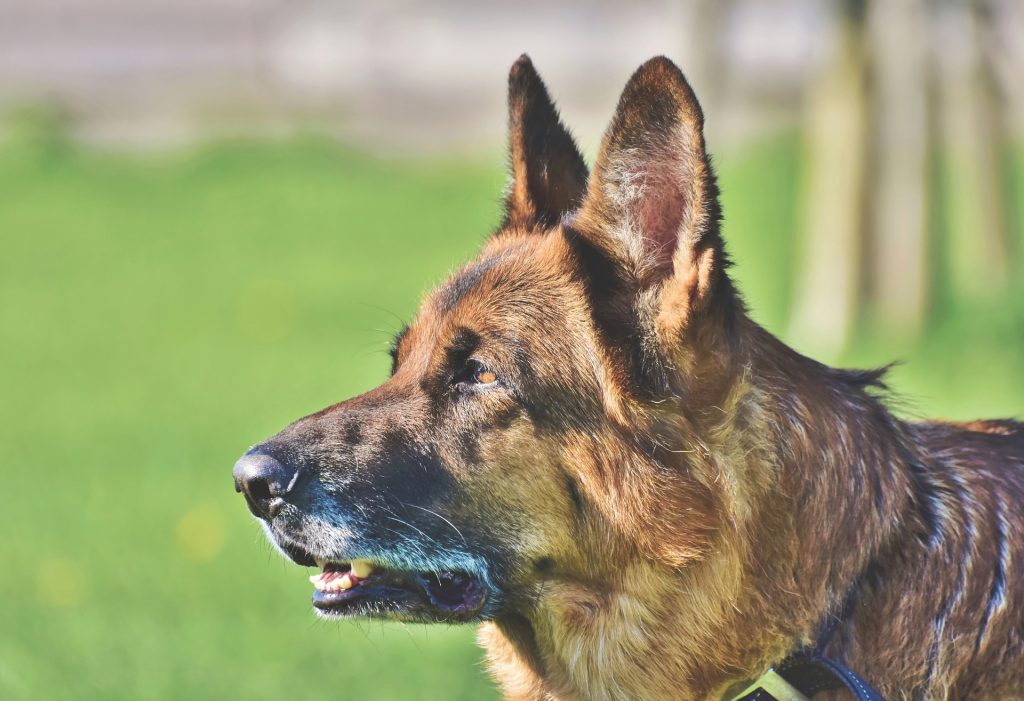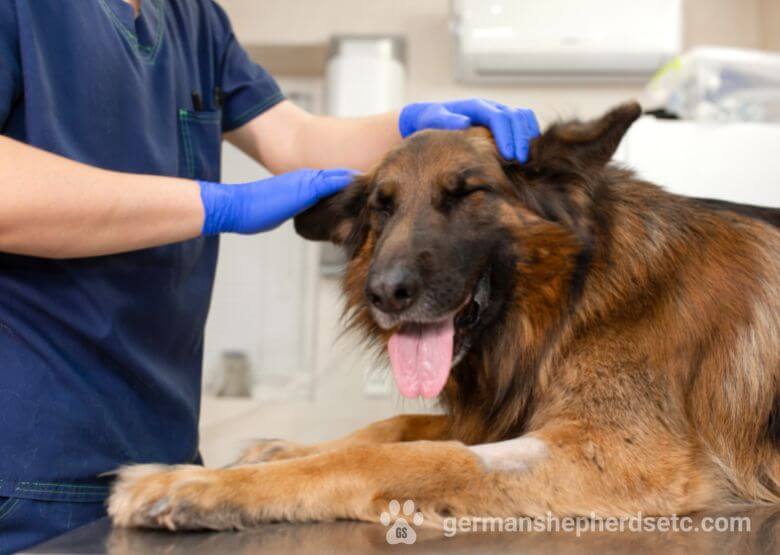Table of Contents
No wonder, German Shepherd dogs are the second most popular breed in the USA and always in the top ten breeds in the world. It is one of the most intelligent, courageous, and loyal dogs. Many dog lovers want to adopt it, but they are worried about the German Shepherd lifespan because these dogs belong to large breeds and can suffer from many disorders connected with their size.
So, how long can a German Shepherd live? On average, its lifespan is about 9-13 years. However, longevity may depend on many factors, including breeding conditions, health care, amount of exercise, the environment, upbringing, and diets. Fortunately, there are many things you can do for your dog to extend its lifespan. Let’s discuss the main factors and how you can alter or add to them right now.
How Long Do German Shepherds Live?
The average life expectancy of a German Shepherd is 9-13 years. However, females may live 1.4 years longer than males. The average female age is 11.1 years, while the median German Shepherd lifespan for male dogs is 9.7 years.
However, the average lifespan is not an overall indicator, and different dogs’ aging processes may differ. Some German Shepherds were reported to live 18-20 years. Mixed-bred Shepherds usually live longer, up to 15 years, as the one reported in Scotland in 2017. In 2014, someone left an elderly dog of 17 years old in a shelter in Gardena, California.
Anyway, you need to remember that larger dogs do not live long, even if they get enough care. Those dogs who do not get it at all can die even earlier than the average. Though, the dogs coming from long-lived lines can have surprising longevity.
Correspondence to Human Years of Life
The age of adolescence comes to these dogs when they are 8-9 months old. Then, they reach adulthood at 18 months old. However, it is not right to consider that one year of life in humans corresponds to seven years in dogs. German Shepherds age at various speeds throughout their lives. So, we can assume only approximately that a one-year-old pup is related to a 15-year-old teenager.
The other measures may be the following:
- two years in dogs equals 25 years in humans;
- three years in dogs are 30 years for people;
- four years of your doggy relates to 35 years of yours;
- five years of GSDs mean 40 years of their owners.
There is a table that can be used to determine the approximate age correspondence of a German Shepherd dog and a human:
| Dog Age (Years) | Human Equivalent (Years) Average GSD | Human Equivalent (Years) Large GSD |
|---|---|---|
| 1 | 15 | 15 |
| 2 | 25 | 25 |
| 3 | 30 | 30 |
| 4 | 35 | 35 |
| 5 | 38 | 40 |
| 6 | 45 | 46 |
| 7 | 49 | 50 |
| 8 | 54 | 55 |
| 9 | 57 | 60 |
| 10 | 63 | 65 |
| 11 | 67 | 69 |
| 12 | 72 | 75 |
| 13 | 77 | 80 |
| 14 | 82 | 85 |
| 15 | 87 | 90 |
| 16 | 92 | 95 |
| 17 | 97 | 100 |
| 18 | 102 | 105 |
| 19 | 107 | 110 |
| 20 | 112 | 115 |
As you can see, one dog year equals five years of life in humans. However, this calculation can only be applied to some dog breeds because smaller breeds tend to age slower. The larger pedigrees have a shorter lifespan. Crossbreeds usually live longer.
What Affects German Shepherd Life Expectancy?

Though so many factors can influence your GSD’s longevity that you cannot control or change, there are many others you can prevent or mitigate. You must first understand the breed’s peculiarities to consider improving your pup’s quality of life.
When Max von Stephanitz was developing this breed, he considered these dogs the best herding helpers ever. The German Shepherds he bred were hardy animals with the best skills to easily adapt to life in families. While the breed was evolving, German Shepherds became increasingly popular as working, police, search and rescue, and family dogs.
Here are some of the most influential factors that can affect your German Shepherd dog’s lifespan.
Feeding
Balanced food is essential for your doggy, starting with its puppyhood. Since it belongs to large breeds, it should be fed with specially formulated kibble to provide joint health. Caloric requirements are also essential at any age. No overfeeding is acceptable because it can lead to obesity, and this issue can cause severe health disorders.
Remember that senior dogs need a more specific formulation to optimize their health condition and enhance it if needed.
Exercise
Your GS puppy needs the correct amount of exercise to grow healthy. You can add 5 minutes of physical activity for every month of the puppy’s life. For example, a 3-month-old pup can walk for 15 minutes per day, while a one-year-old German Shepherd needs 60 minutes of walking. However, the dog should be supervised. Avoid playing on hard surfaces or running down the stairs. Too much exercise can hurt developing joints and cause hip dysplasia in the future.
At the age of two years, your pup needs at least 1-2 hours of exercise daily. That will help it remain in optimum condition until its senior years. If a German Shepherd is not continuously stimulated, it can develop mental and behavioral problems that lead to poor overall health. Such stimulating activities as catching a frisbee or tennis ball can do a lot of good to your doggy. You can also play hide-and-seek with it. Some people even do yoga with their dogs. It sounds weird, but, as a result, it is pretty efficient for keeping an animal healthy and in good working condition until its late years.
Breeding
Apart from many other factors, breeding is crucial for the GSD lifespan. Purebred dogs with the best functionality and temperament qualities but not with specifically desirable physical features are healthier.
If breeders practice in-breeding to preserve some valuable features, it leads to many health problems in the offspring because many issues can hide in recessive genes.
Line-breeding is not so risky because animals are bred to their distant cousins, not siblings. To some extent, it resembles the tendencies of monarchies. The average lifespan of a German Shepherd can be prolonged in this way, and the needed traits are also preserved. This is the method practiced by Max von Stephanitz, a founder of the breed.
The show lines, unfortunately, have a shorter lifespan than working lines. The AKC conformation shows have set strict requirements that endanger the animals’ performance, posture, and lifespan. For example, that strongly desirable slope of the back has led to spine cord deformity in many cases. These sloped backs can cause a lot of health issues.
What Can Decrease the German Shepherd Dog Lifespan?
You can face the causes of your German Shepherd life decrease you won’t be able to control. Here are some of them.
Accidents
A German Shepherd puppy aged between nine and eighteen months is adventurous, naive, and immature. It is also hard to control if it is not neutered or spayed yet. That is why most experts believe that if a doggy survives its first year, it has all the chances to live a healthy and long life.
Among the things that can occasionally happen during the first year of life are being hit by a car, participating in a dog fight, running into sharp objects or climbing fences, and heavy falls. We can also mention congenial health defects and being lost or abandoned at an animal shelter.
Lethal Health Issues
There are also potentially lethal health issues that can reduce the lifespan of GSD pets. Some problems can be hereditary, and they can be controlled or prevented to a certain extent, while others cannot be predicted, anyway.
The research shows that about 50% of senior German Shepherds over ten years of age die from cancer. The most common types here are hemangiosarcoma and bone cancer. Hemangiosarcoma is a condition when cancerous cells grow in the spleen. Such growth causes fatigue and bleeding. Bone cancer develops in microfractures and leads to complete dysfunction of the affected bones.
Other lethal issues in GS dogs involve gastric dilatation and volvulus. Stomach bloats and twists cause them. Such conditions lead to immense electrolyte and fluid imbalances, heart irregularities, and overall intoxication. This syndrome is characteristic of large and deep-chested dogs like German Shepherds.
One more cause of lethality in GSDs is dilated cardiomyopathy. It is the condition when the heart enlarges, but the walls of the cardiac muscle get thin. This can lead to congestive heart failure or immediate death.
Health Problems That Can Shorten the GSD’s Lifespan

Of course, a dog’s health issues depend on its breed and age. While young dogs can die from trauma or infections, more than 50% of older dogs can die from cancer.
If we speak about German Shepherds, let’s consider the results of a big study conducted by Swedish scientists. They researched over 400 thousand German Shepherds and came to the conclusion that these dogs mostly suffer from locomotor issues, such as myelopathy and hip dysplasia. Large breeds are much more prone to musculoskeletal disorders than smaller ones. The study also showed that GSDs could often suffer from immunological diseases.
So, what are the most common health issues in this breed that influence the life expectancy of German Shepherd dogs?
Elbow and Hip Dysplasia
Deformed joints cause this condition. It means that the socket and ball of a joint rub severely against each other. Such factors as nutrition, growth rates, or excessive exercising may affect this joint deterioration. You can also consider obesity and sloped backs.
You need to see your vet immediately if you notice lameness, stiffness, or pain and motion issues in your pup. The early detection of the problem may provide better treatment, or the German Shepherd with hip dysplasia dog’s life expectancy will sufficiently decrease.
The other bone and joint problems in GSDs found by a Zurich study in 45% of the police working dogs is degenerative spinal stenosis, while hip dysplasia may affect about 19.1% of these dogs.
Bloat
Gastric dilatation-volvulus (GDV) or bloat is a serious life-threatening emergency. It happens when the stomach fills with air and starts flipping and dragging the pancreas and spleen with it. If you see that your dog’s stomach is immensely enlarged, the animal is restless, and a lot of foamy salivae comes from its mouth, act immediately. Your dog needs surgery within 30 minutes not to die.
The cause of this awful condition is a one-time feeding per day when the hungry dog gulps the meal very fast. Some other triggers are anxiety and stress.
Allergies
The skin allergy your dog may suffer from is called atopy. Such allergies may influence your pet’s life quality and reduce its lifespan. In fact, it is allergic dermatitis, so it can be caused by food, dust, pollen, yeast, or fleas. The first signs appear between 1 and 3 years of age.
You can detect the first symptoms of this condition when you see your doggy chewing, licking, or rubbing its ears and paws. You can also notice redness, itching, skin thickening, too dry or oily skin, and excessive hair loss.
Contact your veterinarian, and they will prescribe your dog antihistamines, immunotherapy, medicated baths, or specific diets, depending on the allergens.
Degenerative Myelopathy
This condition is also known as the slowly progressing paralysis that affects the front and hind legs. The actual cause of this disease is unknown yet, though veterinarians assume that it can be the accumulation of the degenerating white substance in the spinal cord. This condition is also believed to be caused by the genetic mutation SOD-1. Unfortunately, it is untreatable yet. It results in swaying, problems with balance, standing up, and moving the hind paws across the ground. Such an issue occurs in senior dogs and can be confused with arthritis. You need a professional consultation if you have noticed the first signs of it.
Hemophilia
This disease is an inherited blood clotting disorder caused by the deficiency of some blood clotting and coagulation factors. A dog may get spontaneous bleeding in its abdomen, muscles, or joints.
There are two types of this disease – A and B – that differ by their severity. Hemophilia B is usually milder.
Like some other genetic disorders, Hemophilia is not curable, but it can be managed with the help of specific preparations and blood transfusions.
Epilepsy
Luckily, epilepsy is not as common in dogs as you may expect – only 0.75% of them are affected. However, German Shepherds are more prone to it than other breeds. So, you need to be aware of such symptoms as spasmodic and involuntary muscle movements in your dog.
The condition can be of three types – idiopathic, when the cause cannot be identified; structural epilepsy, as a result of tumors or brain diseases; and reactive epilepsy, caused by low blood sugar or failure of some organs. Idiopathic epilepsy in German Shepherds is inherited, so it cannot be cured but only managed with anti-epileptic medications.
Megaesophagus
This condition occurs when the esophagus, transporting water and food from the throat to the stomach, dilates or is restricted. It can lead to many health problems, such as vomiting, flushing out the food from the mouth, stomach and lung disorders, etc.
The common causes of this condition are nerve diseases and esophagus tissue disorders. The dog regurgitates food and water and starts losing weight. You may hear bad breath, strange sounds in the lungs, and coughing. The dog may also display weakness, starvation, and fever. Show your pet to your vet immediately, and they will prescribe the appropriate treatment to cure an underlying cause.
Your dog can also suffer from other health issues, such as arthritis, cataracts, pannus (an autoimmune condition of the eye), thyroid problems, and some others. It is immensely important to take your dog to the veterinarian regularly to prevent certain conditions or detect them at early stages and diminish their influence on your doggy’s life quality and, as a result, on your German Shepherd lifespan.
How to Extend the Life of a German Shepherd

If you care about your German Shepherd dog lifespan and want to know how to increase it, these recommendations can work well for you. Moreover, they will help your pet live a high-quality and healthy life.
Think About a Well-Balanced Diet
Your GSD’s diet should be well-balanced, without unhealthy sweet treats and overfeeding. Your dog needs low-carb food with 18-20% of protein. Your adult pup should weigh 70-90 pounds (32-41 kg) and, if active enough, needs no more than 2100 calories per day. If for some reason, your doggy’s lifestyle is not too active, it should consume no more than 1500 calories every day to avoid obesity.
If you don’t know what type of diet suits your pet better, it is worth talking to your veterinarian. You may opt for high-quality kibble from reputable manufacturers or a natural raw diet. However, you have to follow the number of calories recommended by this diet. If your dog is prone to allergies, it may be prescribed a specific diet without any poultry or grains because they often cause food allergies.
Watching the Weight Is Critical
As the next step after proper feeding, you need to watch your dog’s weight properly. The best method is to check whether you can feel your pup’s ribs while petting it.
If the ribs are visible, the animal is underweight. Though they have to be touchable, and if you feel an extra layer of skin or fat on their top, your dog may be overweight. The waist should be visible and distinctively detected from the rest of the body. If you weigh your pet regularly and know all the measurements that correspond to the age, you will spare yourself and your Herman Shepherd from the obesity problem.
Exercising and Physical Activities Should Be Adequate.
The lack of physical activity may also lead to obesity. The latter is often a cause of more severe health problems. So, try to keep your doggy in good shape. Remember that German Shepherds are very active and energetic, so they need a lot of room for exercising. Physical activities can be both outdoor and indoor. Regular walks, running, playing in the park, and hiking or biking with you will do your pet a lot of good. If your dog likes swimming, let it do that for a while.
Even if your doggy is older, walks are important. However, the distance needs to be shorter – the ten miles runs every morning are not suitable for it anymore. Be careful about how your pup is walking or running. If you notice that the animal may experience pain or fatigue, turn back home.
Take Care of Your Dog’s Hips
This tip correlates with the previous one. GSDs tend to cause joint and hip issues, so you need to be careful about your dog’s walking high stairs every day or the presence of elevated furniture in your house your dog would like to climb. If there is a need to climb something, you can pick it up with your hands. However, you have to remember several rules. Support its rump with one hand and keep its body leveled to avoid back straining.
Don’t Forget About Mental Stimulation
Your doggy needs a lot of mental stimulation at any age. Use brain games, teach it new tricks, and buy interactive toys. When your dog is young, basic obedience training is important. It will improve its behavior, boost its confidence, and help it avoid dangerous situations. Untrained dogs may not react to your warning commands when they attempt to run out into a busy road or start fighting with other animals. That may be life-threatening.
Try to keep your pup’s stress levels low. Stress tends to relieve harmful free radicals and cause anxiety and exhaustion. Don’t leave your pet alone for a long time because it may feel depressed or aggressive, and its lifespan will be affected a lot if the situation continues day by day.
It is wrong to think that an old dog cannot learn new tricks. You can teach it many tricks, and its brain will be constantly kept engaged. You may also start refreshing some of the tricks it could do when it was younger. Reward your pup and praise it for progress at any age. It is a great way to stimulate its skills.
Never expose your doggy, especially an older one, to a pack of other dogs who may hurt it heavily. However, your pet needs to make new friends and communicate with other animals anyway. Find friends for it of approximately the same age or those who are more mature, depending on the age. That will keep your dog’s mind stimulated.
Choosing a Puppy from the Right Breeder
It is probably one of the most important tips to follow or start with. If you want to get a healthy and long-living German Shepherd, do research for a reputable breeder. Remember that genetics play a great role in your German Shepherd life span. You also need to request health certificates for your puppy and both its parents. Even if they are carriers of recessive genes, their combination can lead to the situation when your long-wanted pet may display some disorders related to them.
Visit Your Vet Regularly
It is always easier to prevent the problem or stop it at an early stage than cure a severe disease. That is why regular veterinary examinations are super important. Early diagnosis and proper treatment can prevent more severe outcomes and extend your GSD lifespan.
You also need to develop an individual vaccination schedule and follow it accurately. Worm treatment is also essential.
You can also check your pup for skin irritations, lumps, sickness signs, or behavioral changes at home.

Severe Need for Grooming
German Shepherds have dense coats, so they need daily brushing. That will promote healthy fur and skin.
Dental health is also very important. Your doggy may suffer from dental diseases, pains, bacteria, and infections. Their products can penetrate the bloodstream and affect other organs badly. So, daily teeth brushing and dental chews are strongly recommended.
You will also need to trim your dog’s nails once a month to spare your pet from discomfort, walking difficulties, pain, and infections from ingrown nails or their breakage.
Only bathe your doggy sometimes. The ideal frequency is once every three months to maintain the proper PH level of the skin.
Neutering or Spaying Your Dog Extends Its Lifespan
If you are not a breeder, spaying or neutering your dog at the proper age is better. If you don’t do that for some reason, you will expose it to additional risks.
Mating or giving birth to puppies are not the only risks you may think about. Many severe diseases, including cancer, are caused by hormonal disbalances related to sexual behavior or lack of mating opportunities.
Final Thoughts
Many people believe that the German Shepherd lifespan of female dogs is longer than that of males. Some research has also supported this. However, if you adopt a male dog and take good care of it, your pup will please you with its energetic and healthy life.
The main factors that influence your German Shepherd lifespan are nutrition, exercise, mental stimulation, and genetics. If you learn more about each of them or just take the information from this article into account, you will enjoy many happy years with your loved pet.
